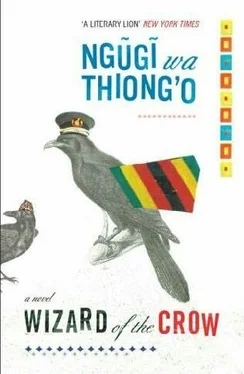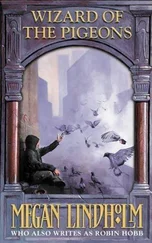Once he bumped into a procession that seemed better organized than any he had come across so far, its clear sense of purpose expressed in a song:
The people have spoken
The people have spoken
Give me back my voice
The people have spoken
Give me back the voice you took from me
The scene changed daily; increasingly he met more people singing about the people’s voice and heading for Eldares. Still, he persisted in his search, tagging along most of them but, like the motorcycle riders, finding that they had no beginning or end.
It came out of nowhere: What if Nyawlra had left him and taken up with another, maybe one of her young comrades? He recalled how Margaret Wariara, later a victim of the deadly virus, had left him. Was there something about him that drove the people he most loved away from him? But try as he might, he could not imagine Nyawlra leaving him without saying good-bye. But then again, had he ever imagined that Wariara, a homely woman, would prostitute herself among tourists in big hotels?
This image of Wariara jolted him into looking for Nyawlra in the bars mushrooming all over the country. They sold all brands of beer and liquor, and fights often erupted as drinkers made claims and counterclaims about the superiority of their brand. He felt awkward just standing around or sitting in a corner without a drink, at least a soda.
He started having a little taste now and then to blend with the drinking crowd. At first he confined himself to one glass a day. But with every passing day, the amount of alcohol he consumed grew. The beer was now his temple. On waking up from a drunken stupor, his reality threatening to engulf him, he would rush back to the temple for salvation. Alcohol never disappointed, always keeping his worries at bay.
His resources were depleted, and he now spent his days looking for cheaper but more potent brew instead of Nyawlra. He would come to think of Nyawlra and even the Wizard of the Crow as characters in a dream in another country far away and long ago. He now had new friends, drunkards like him, and when he had no money he would beg them for a shot or two.
There was much storytelling and ribald joking among the drinking crowd. One day in a bar he found a man reading to a crowded bar from a book he called Devil on the Cross. Whenever he emptied his glass, he would stop and announce that his beak needed wetting. He would resume only after his glass had been replenished by those around him. Inspired by the man’s success in procuring free drinks, Kamltl himself became a talemonger. He told how once he had left his body in a garbage dump and flown high above it as a bird before returning to it just as garbage collectors were about to bury it. The crowd was not impressed with Kamltl’s tales, except for a drunk who always sat by himself in a corner as if in hiding. He who hardly ever said anything now suddenly raised his voice: What did you sayr
The other drunks were surprised to hear the man’s voice, and they asked one another: Has Baalam’s donkey found his voice at lastr Thinking that he was finally beginning to attract an interested audience, Kamltl repeated his story. The drunk, known as Mr. Walking Stick-he sported one with a cross-shaped handle-walked over and gazed at him with something like terror in his eyes, shook his head, and walked back, mumbling, No, it cannot be, he does not carry a bag on his back like the other one. And he has no horns. Nevertheless, the drunk, who had been a permanent fixture in that bar, changed location and thereafter moved from bar to bar, saying to inquisitive tongues, Too long a stay in one seat tires the buttocks.
On another occasion Kamrö told the same drinking crowd how he became a bird and visited all of Africa and the Caribbean Islands, and this was too much for his listeners, who told him to take his naked lies to gullible fools elsewhere. Somehow his stories or the manner of their telling lacked the power that carried people to worlds they had never visited, that showed them wonders they had never seen, that made them forget, for a time, the familiar milieu of endless misery, and so they did not bring many replenishments of drinks. He gave up storytelling, though grudgingly. With not much flowing into his glass, he sometimes left the bars early for what had now become his home, his razed shrine, where he would wake up to find a cat snuggling against him, the same cat that he saw when he first came to the charred ruins. As on that day the cat would mew once and walk away, leaving him wondering if he should follow it but without once bringing himself to do so.
One night, as he was walking out of his favorite bar, he noticed a poster on the wall and something about it made him stop in his tracks. It bore a vague resemblance to him, at least to how he looked before alcohol had taken over his mind and body. No, it was not his face, then or now, because he had never grown his hair long, and the beard made him look like some kind of black Jesus. As he went nearer and touched the poster, the face depicted now slightly suggested Sikiokuu. The writing declared THE WIZARD OF THE CROW, WANTED FOR A PRIZE. He rubbed his eyes and looked at it again. There was a number to call. Why a prize? For what? Was the prize for him, or for whomever turned him in? He was completely at a loss to know what to do, especially when in the days that followed he found other posters with conflicting messages.
One afternoon he went to his bar, Sell-Me-Death, and although he was already totally drunk he still hoped for one more glass. He saw a riderless red motorcycle against the wall where one of the posters of the beard of Jesus Christ on Sikiokuu’s face hung, but this did not bother him; in fact, the war of posters no longer worried him.
What made him envious, even in his drunken state, was the sight of people crowded around a storyteller whose tales and manner of telling them captured the imagination of the audience so much so that some of them had even forgotten that they had come here to drink. The climax came when the storyteller lowered his voice and made hints about knowing something about the pregnancy of a president. People whistled. Then silence, waiting for more. A pregnant president?
“It’s true! Haki ya Mungu!” said the storyteller in a raised voice.
Kamltl could not see the face of the storyteller clearly. But the phrase True, Haki ya Mungu jolted him out of a slumberous languor. When and where did he last hear that phraser
“Even the white doctors were baffled by the strange happening,” the storyteller continued. “But the Wizard of the Crow? Oh, no, not him. I was in the plane when the letter was read and I heard everything. Mr. President, the letter said, you are pregnant and nobody knows what you will bear.”
Who is this man who is mouthing my words? thought Kamltl. And why is he distorting them? Why is he turning them into lies? He felt that he could not let the storymonger go on twisting the meaning of his words. He felt like a writer whose work has been lifted by another only to skew its form and content. Despite being drunk, he felt a need to insist on his writing integrity.
“Hapana! That was not how it went!” he heard himself speaking out, to the consternation of the audience.
They turned toward Kamltl. Those who knew him from this or other bars simply dismissed him as the same drunk who was always trying to spoil a good story. The storyteller was both intrigued and bemused by the intervention. Who was this who had questioned his story in a way that no other listener had done in all the places he had told his tale? “Hapana! It is not how it was. Machokali is my witness. I left him a note there, at the reception, yes, of the, I mean at the reception of the hotel-uh, what did they call it? VIP. New York, yes, Very Important People Hotel, New York, with so many yellow taxis and black garbage bags. Why yellow? Why black? Don’t ask me. Now, what was I saying? My note was addressed to one person and one person only, Machokali, the Minister for Foreigners, I mean, Affairs. And I just wanted to tell him one thing only. One thing. Take care of yourself. Why? I will say it again. This country is pregnant, and what it will bear, nobody knows. That was all. I cannot take this war on my words anymore. I am leaving…”
Читать дальше












